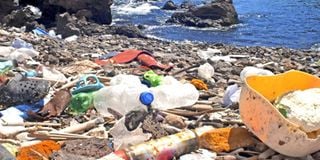UN and environmentalists call for new strategies to tackle plastic pollution

In Kenya, many businesses continue to face the challenge of reducing and even re-using plastics.
With the increasing challenges of climate change and other crises caused by poor waste management, environmentalists and the United Nations are now calling on authorities to adapt to measures that would bring solutions to the menace.
Plastic waste, however, is one of the most significant contributors to surface and wetland pollution, affecting both human and aquatic life. The global production and use of plastic materials is on a resounding streak, thus hampering the regulatory intentions.
According to the National Environment Management Authority's (Nema) national solid waste management strategy report, Nairobi generates about 2,400 tonnes of solid waste per day, 20 per cent of which is plastic waste.
The United Nations environmental programme also sees these challenges as damning concerns that would require serious interventions if the global goal of having a waste-free environment is to be achieved.
While responding to journalists in Nairobi, UNEP's Kenya Coordinator, Dr Cyrille Siewe, confirmed that there are indeed talks to ban plastics in Kenya with a series of intergovernmental talks already taking shape.
"We are currently trying to appeal to the public to adopt our strategies of REUSE, RECYCLE and REFUSE as a way of controlling the incessant supply, he said.
At least 5,000 premature deaths were recorded in Kenya in 2019 due to air pollution, with another study showing that over 19 million people suffer from respiratory problems as a result of burning synthetic materials.
Stakeholders are now calling on the public and authorities to embrace the principle of singularity, which turns the end life of a product into a raw material for production.
This, coupled with strategies to reduce plastic waste from the environment, would be of great help to both human and aquatic life.

A plastic recycling point at the Nyali Public Beach in Mombasa.
"Waste management has an element of correlation with climate change, pollution and natural crises and therefore needs to be treated with great concern," Dr Siewe added.
In 2017, the Kenyan government issued a ban on polythene bags in an attempt to strategically deface all plastic use. However, this is still only 80 per cent successful, with another regulation on the way.
According to the Director of Environmental Enforcement at Nema, Dr Ayub Macharia, the government is taking serious steps to reduce the rate of plastic pollution, even though previous attempts have not yielded real results.
Polythene waste
"In 2007, we started engaging the private sector through the exercise duty but we realised that they were still importing in large quantities and we abandoned it," Dr Macharia noted.
With this resistance and the proliferation of polythene waste, Nema devised a plan to enforce the ban.
"In 2021, we came up with a sustainable waste management policy that gave birth to an Act of the same one year later with serious enforcement strategies that gave us the verve," he added.
"In doing so, Kenya positioned itself as one of the first countries to subject the importation of synthetic products to extended producer responsibility, which requires all importers to regulate their products.
In this way, producers are obliged to control what is released into the environment, helping to reduce unnecessary littering that is usually caused by uncontrolled models. We have set up companies to collect plastics and this should be able to reduce the supply chain of these disrespectful items," the Nema boss added.
Lobby groups have now devised various strategies to spread the anti-plastic gospel. Nairobi's Nyayo Estate, for instance, launched a pilot programme three years ago to support the government's journey towards a plastic-free environment.

Kenya has made commendable strides in the fight against plastic pollution, becoming a regional leader in implementing effective measures to address this environmental crisis.
Speaking on the strategy, one of the pioneers of the Alliance of Nairobi Metro Residents Associations, Teddy Obiero, said that the strategy can be achieved if both the government and the general public pull together towards the basic plastic applications as stipulated in the global targets of achieving plastic free environment materials, at the household level.
"Nyayo estate has 5,000 housing units and we have successfully managed to roll up this plan and escalated it to the neighbourhood," Mr Obiero told Nation.Africa.
However, some manufacturers are still supplying illegal polythene bags to the market, even as the government is laying the groundwork for even more regulations on the plastic menace.
It will therefore be interesting to see how this strategy would play into the system now that the effects of climate change are eating into the continent's already scarce resources.
According to UNEP, the private sector has a huge role to play in de-escalating plastic waste.
"We are urging private sector players to help us regulate the influx supply of these products because if we can slow down the production and supply and perhaps align with this year's world environmental theme of beating plastic pollution, it will have a good effect," Dr Siewe said.





